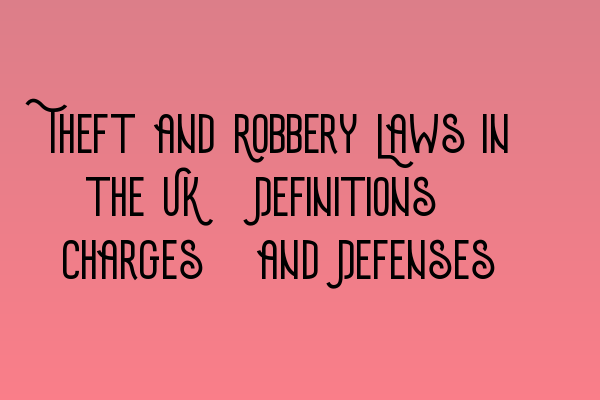Theft and Robbery Laws in the UK: Definitions, Charges, and Defenses
At SQE Criminal Law & Practice Law UK, we understand the importance of staying informed and prepared in the field of criminal law. In this article, we will provide you with a comprehensive overview of theft and robbery laws in the UK, including definitions, charges, and defenses. Whether you are a solicitor, a law student, or simply interested in criminal law, this article will enhance your understanding of these crucial legal concepts.
What is Theft?
Theft is a criminal offense that involves dishonestly appropriating property belonging to another with the intention to permanently deprive them of it. The element of dishonesty is crucial in establishing a theft offense. Theft charges can range from petty theft of low value items to more serious cases involving high-value assets.
If you want to expand your expertise in criminal law, we highly recommend attending our Workshops and Seminars on Criminal Practice: Expanding Your Expertise. These events provide valuable insights and keep you updated with the latest legal developments.
What is Robbery?
Robbery is a more serious offense compared to theft, as it involves theft accompanied by the use or threat of force against the victim. The act of forcibly taking someone’s property while causing them fear or harm distinguishes robbery from theft. Robbery charges carry harsher penalties due to the increased level of violence involved.
To stay informed and prepared in the ever-evolving landscape of criminal laws, check out our article on Updates in UK Criminal Laws: Staying Informed and Prepared. It provides valuable information to help you navigate through the changes and serve your clients effectively.
Defenses Against Theft and Robbery Charges
If you or your client is facing theft or robbery charges, it is crucial to explore any available defenses. Common defenses in these cases include:
- Lack of Intent: If the person accused of theft or robbery did not have the intention to permanently deprive the owner of their property, it can be asserted as a defense.
- Mistaken Identity: If there is substantial evidence to prove that the accused was not present at the scene or there is doubt regarding their identity as the perpetrator, a defense based on mistaken identity can be raised.
- Consent: If the alleged victim gave consent or authorized the accused person to take the property, it can be used as a defense against theft or robbery charges.
To enhance your SQE criminal law study group experience and gain valuable insights, read our article on Enhancing Your SQE Criminal Law Study Group Experience. It provides tips and strategies to make the most out of your study sessions.
Conclusion
Understanding theft and robbery laws in the UK is essential for both legal professionals and individuals interested in criminal law. By knowing the definitions, charges, and potential defenses, you can better navigate through criminal cases and provide effective representation.
If you want to dive deeper into criminal evidence rules, we recommend reading our detailed analysis on Decoding Criminal Evidence Rules: A Detailed Analysis. It will provide you with a thorough understanding of the intricacies of criminal evidence in the UK.
For a comprehensive exploration of fraud and financial crimes in the UK, check out our article on Deep Dive into Fraud and Financial Crimes in the UK. It covers various aspects of these complex offenses and can further expand your knowledge in the field.
